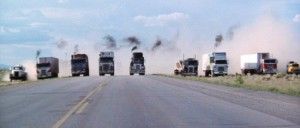Studies show tradeoffs on health vs. environment
 Two new studies show cleaning the environment to improve health is about tradeoffs. One study is on clean-air regulations, the other on diesel truck exhausts.
Two new studies show cleaning the environment to improve health is about tradeoffs. One study is on clean-air regulations, the other on diesel truck exhausts.
The studies give policymakers more information on the choices they will be making.
The first study is by economist John Husing, “Policy Choices & the Inland Empire’s Public Health.” He is the vice president of Economics & Politics Inc., a think tank that studies the Inland Empire. He also produced a PowerPoint summary of his findings, “Public Health, Socio-Economics & Logistics in the Inland Empire.”
Husing cited a University of Wisconsin study that found poor health was attributed to four factors:
- 40 percent socio-economics;
- 30 percent individual health behaviors;
- 20 percent medical care;
- 10 percent environmental causes.
Husing pointed out several “clashes” between socio-economic health and clean air regulations that end up worsening public health:
- Cal-EPA’s ozone reduction goal is not possible unless truck emissions are reduced below what current technology can achieve.
- Cal-EPA’s ozone reduction goal is not possible unless all vehicles in California are electrified. Yet currently, less than 1 percent of all registered vehicles in California are electric, according to SmartGridNews.
- There’s a clash between public health and the California Environmental Quality Act. When CEQA is too rigorously enforced, Husing wrote, it becomes the “Let’s sue until they run out of money act.” When that happens, it increases poverty, but serves such groups a “NIMBYS [Not in My Back Yarders], the Natural Resources Defense Fund, the Center for Biological Diversity … some lawyers, and unions.”
Although air pollution might be reduced, according to Husing, actual public health could be reduced by increasing poverty.
That’s because, citing the Wisconsin study mentioned above, Husing said the environment actually is the lowest on the rung of importance of the four health factors, but “it has been elevated almost to the exclusion of other priorities.”
Warehouses
What happened to manufacturing is now being proposed for trucking and transporting of goods.
In recent years, the Inland Empire has become a giant warehouse for Amazon, Target, Walmart and other companies shipping goods into the Los Angeles basin. Logistics and shipping jobs accounted for 16.7 percent of Inland Empire job growth from 1990 to 2012, and 27.6 percent of job growth from 2012 to 2013.
Husing made the case that it is such modest jobs that lift people out of poverty and into the middle class, and thereby into improved health. “Bluntly, it does our region little good if we create a pristine environment but let people increasingly die of the diseases and behaviors fostered by poverty,” Husing concluded.
Second study: Diesel trucks
The second study concerns diesel trucks and the California Construction Trucking Association. Joe Rajkocacz, director of governmental affairs for the CCTA, explained the matter in an email to CalWatchdog.com.
He said the CCTA has been embroiled for the last four years in a lawsuit, which it lost, against the California Air Resources Board to stop the mandatory installation of $20,000 diesel exhaust filters on trucks and new, cleaner truck engines. The lawsuit contended the regulations caused undue economic hardship for the trucking industry. The regulations were imposed by CARB under AB32, the Global Warming Solutions Act of 2006.
CARB contended the regulations were needed to make California’s air healthier.
On March 3, the the U.S. Court of Appeals for the Ninth Circuit rejected the CCTA’s appeal on the grounds it was filed in the wrong court. The CCTA, however, claimed it is exempt from California’s air pollution regulations under federal law and that is why it appealed in federal court.
CCTA said it now will appeal the case to the U.S. Supreme Court. And it may take up the matter through other legal channels, such as challenging the science on which the air quality regulations are based. CARB contends exposure to diesel soot (particulate matter) causes premature deaths.
CARB’s science has reportedly been supported by a recent USC study showing that clean air is linked to stronger lungs in children. CARB is touting the USC study as a basis for its air pollution regulations, including on diesel trucks.
However, physicist and health researcher Jim Enstrom, Ph.D., MPH, said in a telephone interview the USC study ignores that children’s immune systems and lung capacity get stronger as they grow older. Enstrom is the author of a 2005 study that found there is no relationship between particulate matter in the air and mortality rates of the elderly.
Rajkovacz said that any relationship between diesel exhausts and mortality “doesn’t exist other than in the minds of rogue environmentalists both within and outside of the California Environmental Protection Agency.”
Future court proceedings will decide the legal issues. But no doubt the controversy of health and prosperity will continue.
Related Articles
Legislative transparency bill shelved again
Congresswoman Nancy Pelosi was mocked for saying about the Affordable Care Act, “We have to pass the bill so that
CA rooftop solar will cost other customers $1 billion per year
Wealthy rooftop solar homeowners will shift $1.1 billion per year in extra costs onto other electric ratepayers by the year
100,000 lacking ID could lose Covered CA coverage
Covered California could lose up to 100,000 enrollees who haven’t proven their eligibility under the state’s version of the Affordable Care




